Role of Parental Interaction in Child Cognitive and Social Growth
VerifiedAdded on 2020/07/22
|6
|1686
|57
Essay
AI Summary
The period from ages two to five is critical for children's cognitive and social growth, significantly influenced by parental interaction. This essay explores various theories of child development, emphasizing the significant impact of parenting styles and interactions on a child’s learning and behavior. Key theorists like Jean Piaget highlight stages where children evolve cognitively through active exploration, while Lev Vygotsky emphasizes cultural tools in cognitive advancement. Erik Erikson outlines social skill acquisition across eight stages. Parental involvement in activities such as reading or structured play is crucial for fostering language skills, problem-solving abilities, and socio-emotional development. Additionally, attachment theory underscores the importance of a secure parent-child relationship, influencing children's ability to form healthy relationships later on. Effective parental guidance helps children navigate physical, cognitive, and social challenges by providing support and scaffolding as needed. The essay concludes that parents are instrumental in their child's holistic development, and understanding developmental stages allows caregivers to provide appropriate care and education.

Human Relationships
And
Life Transitions
And
Life Transitions
Paraphrase This Document
Need a fresh take? Get an instant paraphrase of this document with our AI Paraphraser
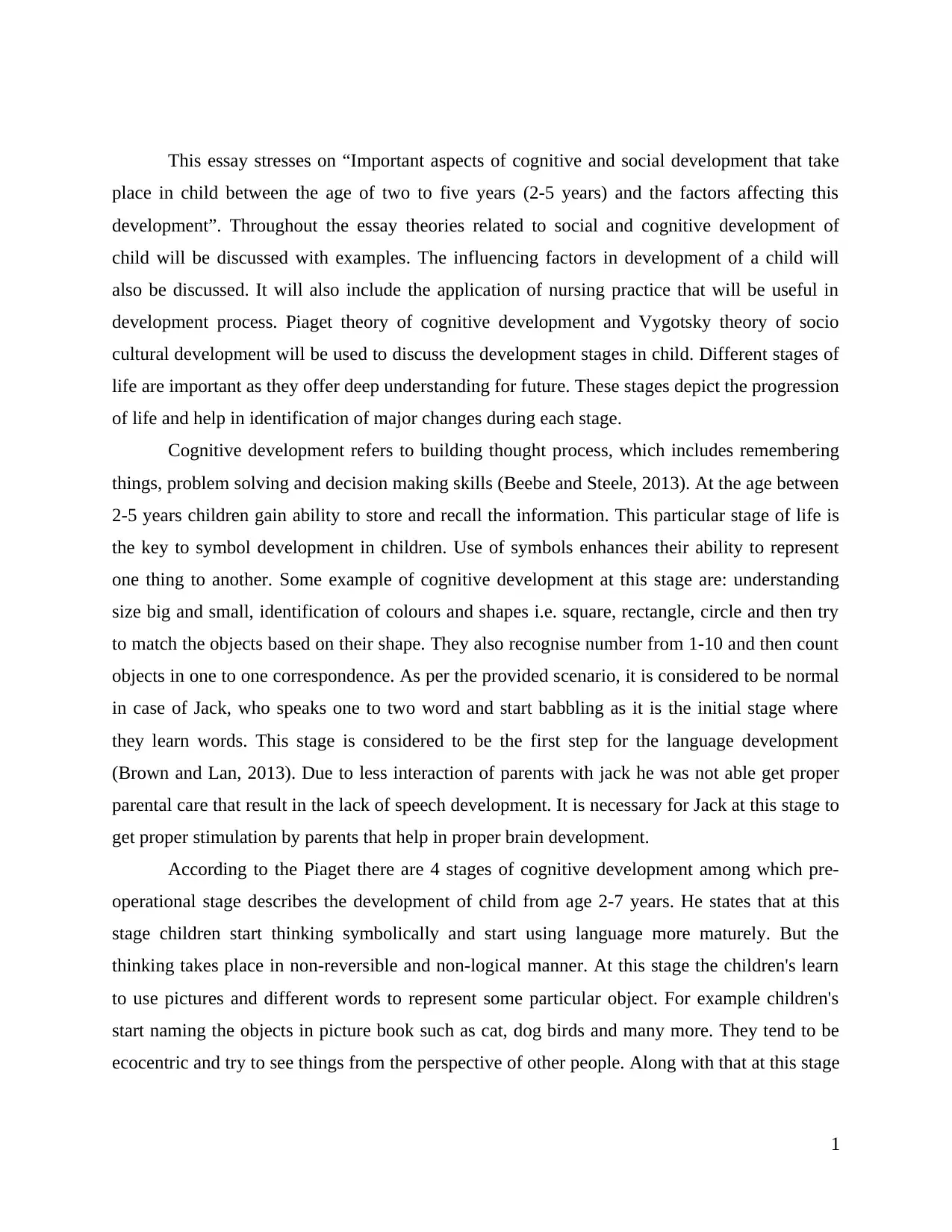
This essay stresses on “Important aspects of cognitive and social development that take
place in child between the age of two to five years (2-5 years) and the factors affecting this
development”. Throughout the essay theories related to social and cognitive development of
child will be discussed with examples. The influencing factors in development of a child will
also be discussed. It will also include the application of nursing practice that will be useful in
development process. Piaget theory of cognitive development and Vygotsky theory of socio
cultural development will be used to discuss the development stages in child. Different stages of
life are important as they offer deep understanding for future. These stages depict the progression
of life and help in identification of major changes during each stage.
Cognitive development refers to building thought process, which includes remembering
things, problem solving and decision making skills (Beebe and Steele, 2013). At the age between
2-5 years children gain ability to store and recall the information. This particular stage of life is
the key to symbol development in children. Use of symbols enhances their ability to represent
one thing to another. Some example of cognitive development at this stage are: understanding
size big and small, identification of colours and shapes i.e. square, rectangle, circle and then try
to match the objects based on their shape. They also recognise number from 1-10 and then count
objects in one to one correspondence. As per the provided scenario, it is considered to be normal
in case of Jack, who speaks one to two word and start babbling as it is the initial stage where
they learn words. This stage is considered to be the first step for the language development
(Brown and Lan, 2013). Due to less interaction of parents with jack he was not able get proper
parental care that result in the lack of speech development. It is necessary for Jack at this stage to
get proper stimulation by parents that help in proper brain development.
According to the Piaget there are 4 stages of cognitive development among which pre-
operational stage describes the development of child from age 2-7 years. He states that at this
stage children start thinking symbolically and start using language more maturely. But the
thinking takes place in non-reversible and non-logical manner. At this stage the children's learn
to use pictures and different words to represent some particular object. For example children's
start naming the objects in picture book such as cat, dog birds and many more. They tend to be
ecocentric and try to see things from the perspective of other people. Along with that at this stage
1
place in child between the age of two to five years (2-5 years) and the factors affecting this
development”. Throughout the essay theories related to social and cognitive development of
child will be discussed with examples. The influencing factors in development of a child will
also be discussed. It will also include the application of nursing practice that will be useful in
development process. Piaget theory of cognitive development and Vygotsky theory of socio
cultural development will be used to discuss the development stages in child. Different stages of
life are important as they offer deep understanding for future. These stages depict the progression
of life and help in identification of major changes during each stage.
Cognitive development refers to building thought process, which includes remembering
things, problem solving and decision making skills (Beebe and Steele, 2013). At the age between
2-5 years children gain ability to store and recall the information. This particular stage of life is
the key to symbol development in children. Use of symbols enhances their ability to represent
one thing to another. Some example of cognitive development at this stage are: understanding
size big and small, identification of colours and shapes i.e. square, rectangle, circle and then try
to match the objects based on their shape. They also recognise number from 1-10 and then count
objects in one to one correspondence. As per the provided scenario, it is considered to be normal
in case of Jack, who speaks one to two word and start babbling as it is the initial stage where
they learn words. This stage is considered to be the first step for the language development
(Brown and Lan, 2013). Due to less interaction of parents with jack he was not able get proper
parental care that result in the lack of speech development. It is necessary for Jack at this stage to
get proper stimulation by parents that help in proper brain development.
According to the Piaget there are 4 stages of cognitive development among which pre-
operational stage describes the development of child from age 2-7 years. He states that at this
stage children start thinking symbolically and start using language more maturely. But the
thinking takes place in non-reversible and non-logical manner. At this stage the children's learn
to use pictures and different words to represent some particular object. For example children's
start naming the objects in picture book such as cat, dog birds and many more. They tend to be
ecocentric and try to see things from the perspective of other people. Along with that at this stage
1
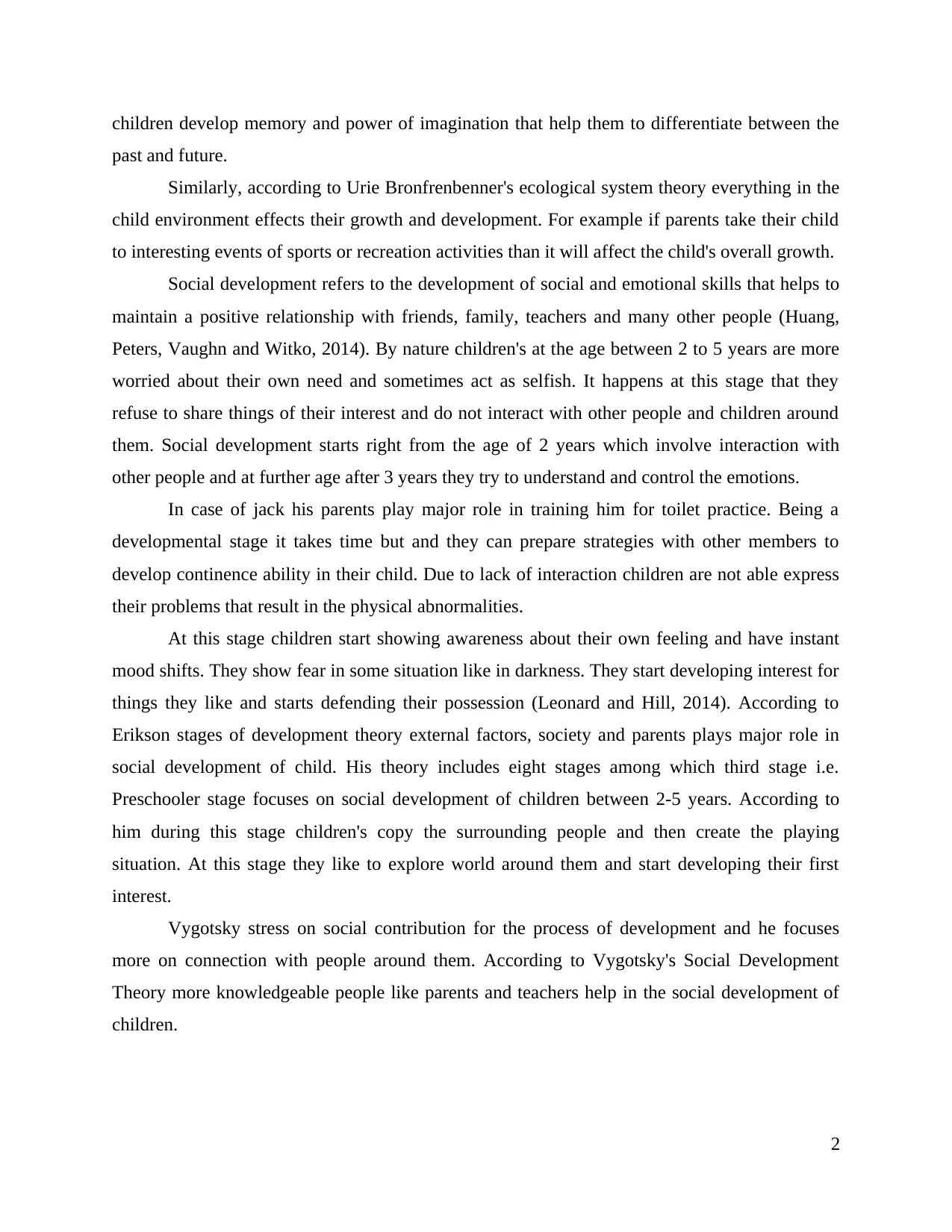
children develop memory and power of imagination that help them to differentiate between the
past and future.
Similarly, according to Urie Bronfrenbenner's ecological system theory everything in the
child environment effects their growth and development. For example if parents take their child
to interesting events of sports or recreation activities than it will affect the child's overall growth.
Social development refers to the development of social and emotional skills that helps to
maintain a positive relationship with friends, family, teachers and many other people (Huang,
Peters, Vaughn and Witko, 2014). By nature children's at the age between 2 to 5 years are more
worried about their own need and sometimes act as selfish. It happens at this stage that they
refuse to share things of their interest and do not interact with other people and children around
them. Social development starts right from the age of 2 years which involve interaction with
other people and at further age after 3 years they try to understand and control the emotions.
In case of jack his parents play major role in training him for toilet practice. Being a
developmental stage it takes time but and they can prepare strategies with other members to
develop continence ability in their child. Due to lack of interaction children are not able express
their problems that result in the physical abnormalities.
At this stage children start showing awareness about their own feeling and have instant
mood shifts. They show fear in some situation like in darkness. They start developing interest for
things they like and starts defending their possession (Leonard and Hill, 2014). According to
Erikson stages of development theory external factors, society and parents plays major role in
social development of child. His theory includes eight stages among which third stage i.e.
Preschooler stage focuses on social development of children between 2-5 years. According to
him during this stage children's copy the surrounding people and then create the playing
situation. At this stage they like to explore world around them and start developing their first
interest.
Vygotsky stress on social contribution for the process of development and he focuses
more on connection with people around them. According to Vygotsky's Social Development
Theory more knowledgeable people like parents and teachers help in the social development of
children.
2
past and future.
Similarly, according to Urie Bronfrenbenner's ecological system theory everything in the
child environment effects their growth and development. For example if parents take their child
to interesting events of sports or recreation activities than it will affect the child's overall growth.
Social development refers to the development of social and emotional skills that helps to
maintain a positive relationship with friends, family, teachers and many other people (Huang,
Peters, Vaughn and Witko, 2014). By nature children's at the age between 2 to 5 years are more
worried about their own need and sometimes act as selfish. It happens at this stage that they
refuse to share things of their interest and do not interact with other people and children around
them. Social development starts right from the age of 2 years which involve interaction with
other people and at further age after 3 years they try to understand and control the emotions.
In case of jack his parents play major role in training him for toilet practice. Being a
developmental stage it takes time but and they can prepare strategies with other members to
develop continence ability in their child. Due to lack of interaction children are not able express
their problems that result in the physical abnormalities.
At this stage children start showing awareness about their own feeling and have instant
mood shifts. They show fear in some situation like in darkness. They start developing interest for
things they like and starts defending their possession (Leonard and Hill, 2014). According to
Erikson stages of development theory external factors, society and parents plays major role in
social development of child. His theory includes eight stages among which third stage i.e.
Preschooler stage focuses on social development of children between 2-5 years. According to
him during this stage children's copy the surrounding people and then create the playing
situation. At this stage they like to explore world around them and start developing their first
interest.
Vygotsky stress on social contribution for the process of development and he focuses
more on connection with people around them. According to Vygotsky's Social Development
Theory more knowledgeable people like parents and teachers help in the social development of
children.
2
⊘ This is a preview!⊘
Do you want full access?
Subscribe today to unlock all pages.

Trusted by 1+ million students worldwide
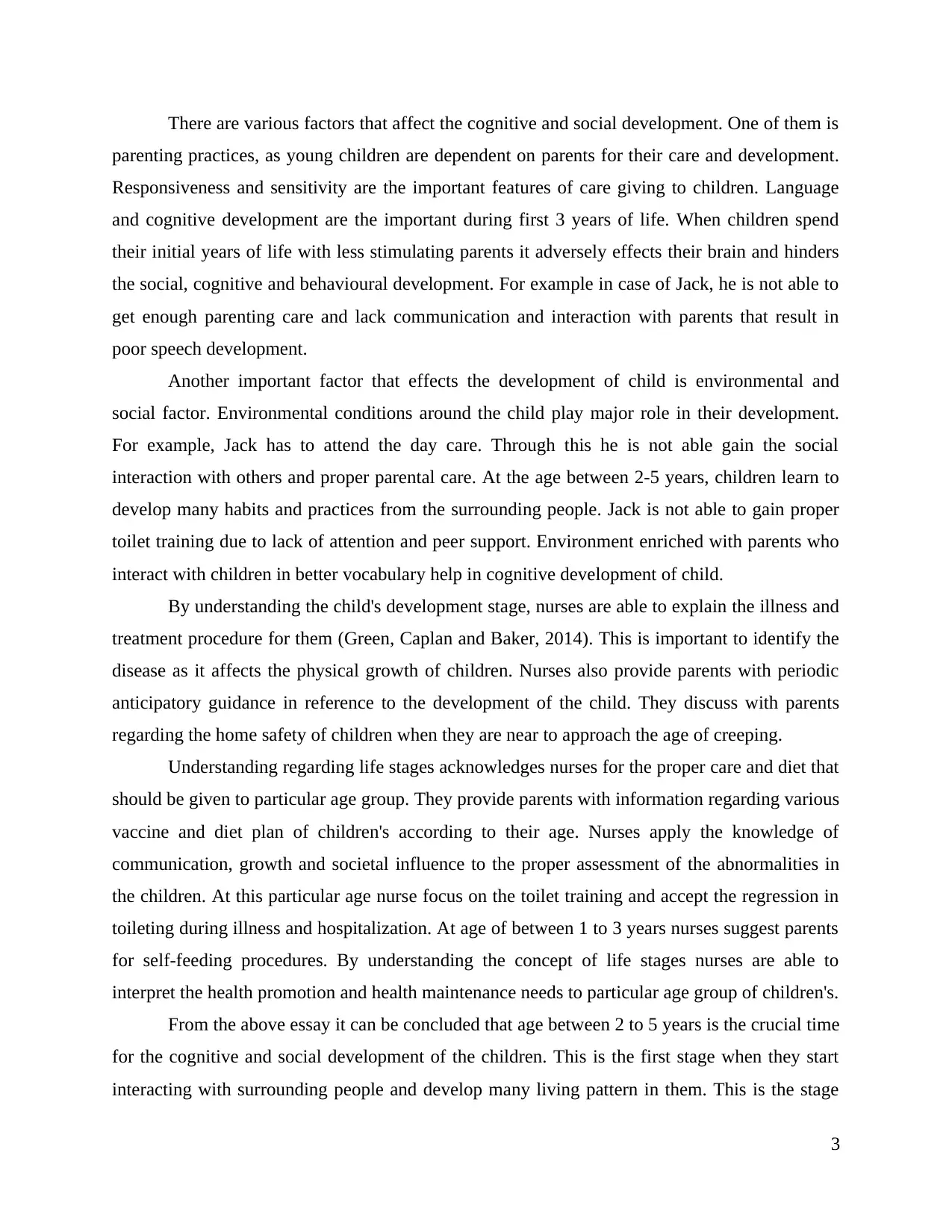
There are various factors that affect the cognitive and social development. One of them is
parenting practices, as young children are dependent on parents for their care and development.
Responsiveness and sensitivity are the important features of care giving to children. Language
and cognitive development are the important during first 3 years of life. When children spend
their initial years of life with less stimulating parents it adversely effects their brain and hinders
the social, cognitive and behavioural development. For example in case of Jack, he is not able to
get enough parenting care and lack communication and interaction with parents that result in
poor speech development.
Another important factor that effects the development of child is environmental and
social factor. Environmental conditions around the child play major role in their development.
For example, Jack has to attend the day care. Through this he is not able gain the social
interaction with others and proper parental care. At the age between 2-5 years, children learn to
develop many habits and practices from the surrounding people. Jack is not able to gain proper
toilet training due to lack of attention and peer support. Environment enriched with parents who
interact with children in better vocabulary help in cognitive development of child.
By understanding the child's development stage, nurses are able to explain the illness and
treatment procedure for them (Green, Caplan and Baker, 2014). This is important to identify the
disease as it affects the physical growth of children. Nurses also provide parents with periodic
anticipatory guidance in reference to the development of the child. They discuss with parents
regarding the home safety of children when they are near to approach the age of creeping.
Understanding regarding life stages acknowledges nurses for the proper care and diet that
should be given to particular age group. They provide parents with information regarding various
vaccine and diet plan of children's according to their age. Nurses apply the knowledge of
communication, growth and societal influence to the proper assessment of the abnormalities in
the children. At this particular age nurse focus on the toilet training and accept the regression in
toileting during illness and hospitalization. At age of between 1 to 3 years nurses suggest parents
for self-feeding procedures. By understanding the concept of life stages nurses are able to
interpret the health promotion and health maintenance needs to particular age group of children's.
From the above essay it can be concluded that age between 2 to 5 years is the crucial time
for the cognitive and social development of the children. This is the first stage when they start
interacting with surrounding people and develop many living pattern in them. This is the stage
3
parenting practices, as young children are dependent on parents for their care and development.
Responsiveness and sensitivity are the important features of care giving to children. Language
and cognitive development are the important during first 3 years of life. When children spend
their initial years of life with less stimulating parents it adversely effects their brain and hinders
the social, cognitive and behavioural development. For example in case of Jack, he is not able to
get enough parenting care and lack communication and interaction with parents that result in
poor speech development.
Another important factor that effects the development of child is environmental and
social factor. Environmental conditions around the child play major role in their development.
For example, Jack has to attend the day care. Through this he is not able gain the social
interaction with others and proper parental care. At the age between 2-5 years, children learn to
develop many habits and practices from the surrounding people. Jack is not able to gain proper
toilet training due to lack of attention and peer support. Environment enriched with parents who
interact with children in better vocabulary help in cognitive development of child.
By understanding the child's development stage, nurses are able to explain the illness and
treatment procedure for them (Green, Caplan and Baker, 2014). This is important to identify the
disease as it affects the physical growth of children. Nurses also provide parents with periodic
anticipatory guidance in reference to the development of the child. They discuss with parents
regarding the home safety of children when they are near to approach the age of creeping.
Understanding regarding life stages acknowledges nurses for the proper care and diet that
should be given to particular age group. They provide parents with information regarding various
vaccine and diet plan of children's according to their age. Nurses apply the knowledge of
communication, growth and societal influence to the proper assessment of the abnormalities in
the children. At this particular age nurse focus on the toilet training and accept the regression in
toileting during illness and hospitalization. At age of between 1 to 3 years nurses suggest parents
for self-feeding procedures. By understanding the concept of life stages nurses are able to
interpret the health promotion and health maintenance needs to particular age group of children's.
From the above essay it can be concluded that age between 2 to 5 years is the crucial time
for the cognitive and social development of the children. This is the first stage when they start
interacting with surrounding people and develop many living pattern in them. This is the stage
3
Paraphrase This Document
Need a fresh take? Get an instant paraphrase of this document with our AI Paraphraser
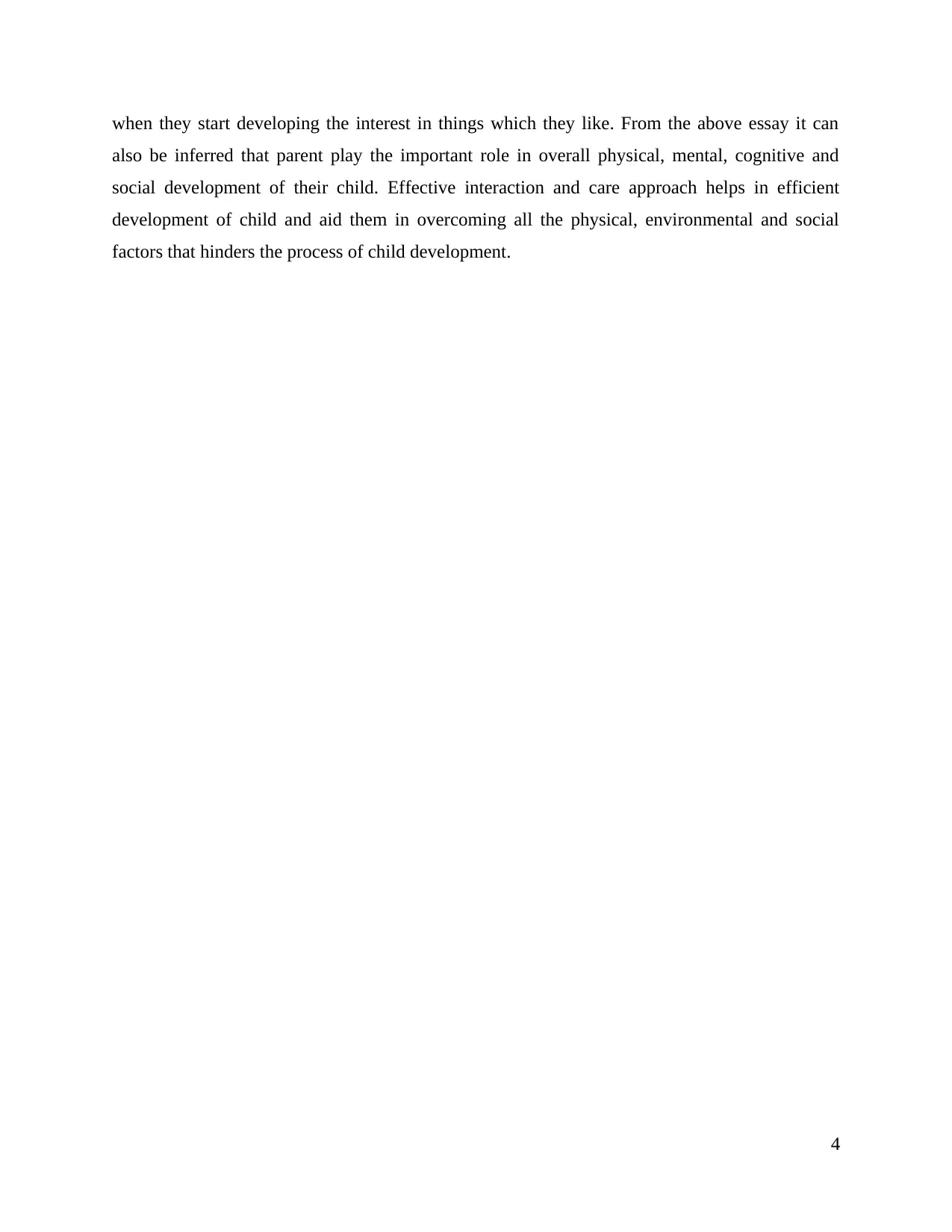
when they start developing the interest in things which they like. From the above essay it can
also be inferred that parent play the important role in overall physical, mental, cognitive and
social development of their child. Effective interaction and care approach helps in efficient
development of child and aid them in overcoming all the physical, environmental and social
factors that hinders the process of child development.
4
also be inferred that parent play the important role in overall physical, mental, cognitive and
social development of their child. Effective interaction and care approach helps in efficient
development of child and aid them in overcoming all the physical, environmental and social
factors that hinders the process of child development.
4
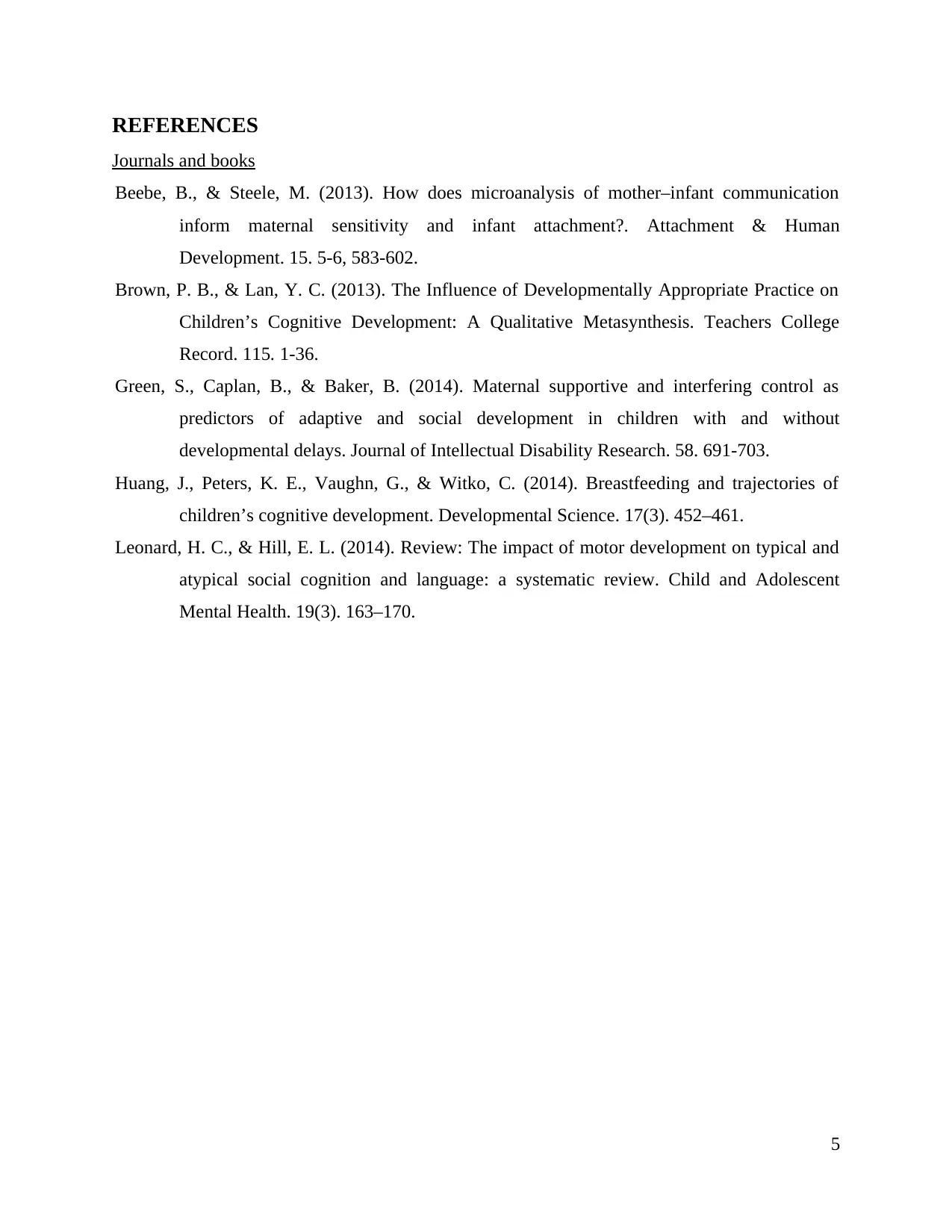
REFERENCES
Journals and books
Beebe, B., & Steele, M. (2013). How does microanalysis of mother–infant communication
inform maternal sensitivity and infant attachment?. Attachment & Human
Development. 15. 5-6, 583-602.
Brown, P. B., & Lan, Y. C. (2013). The Influence of Developmentally Appropriate Practice on
Children’s Cognitive Development: A Qualitative Metasynthesis. Teachers College
Record. 115. 1-36.
Green, S., Caplan, B., & Baker, B. (2014). Maternal supportive and interfering control as
predictors of adaptive and social development in children with and without
developmental delays. Journal of Intellectual Disability Research. 58. 691-703.
Huang, J., Peters, K. E., Vaughn, G., & Witko, C. (2014). Breastfeeding and trajectories of
children’s cognitive development. Developmental Science. 17(3). 452–461.
Leonard, H. C., & Hill, E. L. (2014). Review: The impact of motor development on typical and
atypical social cognition and language: a systematic review. Child and Adolescent
Mental Health. 19(3). 163–170.
5
Journals and books
Beebe, B., & Steele, M. (2013). How does microanalysis of mother–infant communication
inform maternal sensitivity and infant attachment?. Attachment & Human
Development. 15. 5-6, 583-602.
Brown, P. B., & Lan, Y. C. (2013). The Influence of Developmentally Appropriate Practice on
Children’s Cognitive Development: A Qualitative Metasynthesis. Teachers College
Record. 115. 1-36.
Green, S., Caplan, B., & Baker, B. (2014). Maternal supportive and interfering control as
predictors of adaptive and social development in children with and without
developmental delays. Journal of Intellectual Disability Research. 58. 691-703.
Huang, J., Peters, K. E., Vaughn, G., & Witko, C. (2014). Breastfeeding and trajectories of
children’s cognitive development. Developmental Science. 17(3). 452–461.
Leonard, H. C., & Hill, E. L. (2014). Review: The impact of motor development on typical and
atypical social cognition and language: a systematic review. Child and Adolescent
Mental Health. 19(3). 163–170.
5
⊘ This is a preview!⊘
Do you want full access?
Subscribe today to unlock all pages.

Trusted by 1+ million students worldwide
1 out of 6
Related Documents
Your All-in-One AI-Powered Toolkit for Academic Success.
+13062052269
info@desklib.com
Available 24*7 on WhatsApp / Email
![[object Object]](/_next/static/media/star-bottom.7253800d.svg)
Unlock your academic potential
Copyright © 2020–2026 A2Z Services. All Rights Reserved. Developed and managed by ZUCOL.





